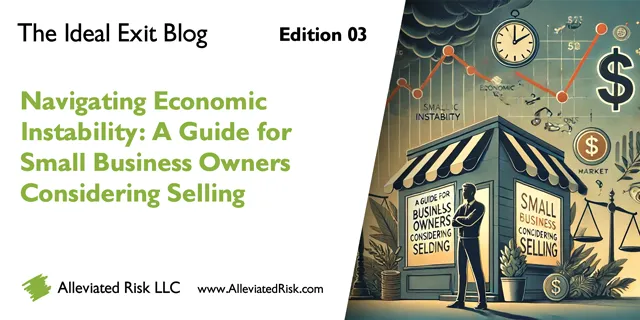
Navigating Economic Instability: A Guide for Small Business Owners Considering Selling
In recent years, economic instability has become a persistent concern for small business owners worldwide. Fluctuating markets, unpredictable consumer behavior, and global events like the COVID-19 pandemic have all contributed to an environment of uncertainty. If you're a small business owner contemplating selling your business, understanding how economic instability impacts this decision is crucial.
Understanding Economic Instability
Economic instability refers to the unpredictable fluctuations in economic factors such as inflation rates, interest rates, unemployment rates, and GDP growth. These fluctuations can be triggered by various events, including geopolitical tensions, natural disasters, or pandemics. Economic instability can lead to reduced consumer spending, increased cost of goods, and tighter credit conditions, all of which can impact the valuation and salability of your business.
Assess the Current Market Conditions
Before deciding to sell, it's essential to evaluate the current market conditions and how they might affect your business's value. Here are a few aspects to consider:
Industry Trends: Some industries are more resilient to economic instability than others. Research how your industry is currently performing and projected to perform in the near future.
Buyer Sentiment: Economic instability can affect buyer confidence. Potential buyers may be more cautious and risk-averse, which could impact their willingness to pay a premium for your business.
Financing Availability: During times of economic uncertainty, obtaining financing can be more challenging for buyers, potentially limiting the pool of qualified buyers.
Positioning Your Business for Sale
Even in uncertain times, there are steps you can take to make your business more attractive to potential buyers:
Financial Health: Ensure your financial statements are in order and reflect a healthy, stable business. Clean, transparent financial records can instill confidence in potential buyers.
Diversify Revenue Streams: Businesses with multiple revenue streams are often viewed as more stable and less risky. If possible, demonstrate how your business can generate income from diverse sources.
Operational Efficiency: Streamline operations to reduce costs and improve margins. Efficient businesses are more attractive to buyers, especially in unstable economic conditions.
Customer Base: A loyal and diverse customer base can be a significant selling point. It shows that your business has a stable source of revenue.
Timing the Sale
Timing can be critical when selling a business, especially during periods of economic instability. Here are a few timing considerations:
Market Cycles: Economic conditions are cyclical. If you have the flexibility, consider waiting for a more stable period to sell, when buyer confidence and financing options may be more favorable.
Personal Circumstances: Consider your personal situation and long-term goals. Sometimes, personal reasons for selling might outweigh waiting for perfect market conditions.
Strategic Buyers: During unstable times, strategic buyers who are looking to acquire businesses for growth or expansion can be more active. These buyers may be willing to pay a premium for a business that fits their strategic goals.
Seeking Professional Guidance
Given the complexities involved in selling a business during economic instability, seeking professional guidance is highly recommended. Business brokers, financial advisors, and legal counsel can provide invaluable insights and help navigate the intricacies of the sale process.
Conclusion
Economic instability presents unique challenges and opportunities for small business owners considering selling their business. By understanding market conditions, positioning your business attractively, and seeking professional guidance, you can make informed decisions that align with your financial and personal goals. While the path may be uncertain, with careful planning and strategic action, you can successfully navigate the sale of your business even in the most turbulent economic times.
For more insights and personalized advice, feel free to reach out to our team of experts who specialize in helping small business owners achieve their exit goals.
My Ideal Exit Newsletter
Looking to sell your small business and want to maximize its value?
Our 💥💥 exclusive newsletter 💥💥 offers actionable insights on business valuation, expert tips for creating a winning exit strategy, and the latest market trends in acquisitions. You’ll make your business more attractive before the sale. Sign up now to stay ahead in your journey toward a successful business exit!
👉👉👉 Signup Here Today 👉👉👉 https://www.alleviatedrisk.com/get-the-ideal-exit-newsletter
We cover elements to enhance your preparedness for selling a business, and ultimately achieve your 🎯 goal of achieving My Ideal Exit.
1. 📊 Valuation Expertise: Insights on how to maximize the value of your business.
2. ⛵ Exit Strategy Optimization: Tips on planning a smooth and profitable exit.
3. 📈 Market Trends: Stay updated on current mergers, acquisitions, and industry shifts.
4. 🤝 Buyer Connections: Discover potential buyers and strategic partnerships.
5. 💰 Business Growth Hacks: Strategies to boost business attractiveness before a sale.

